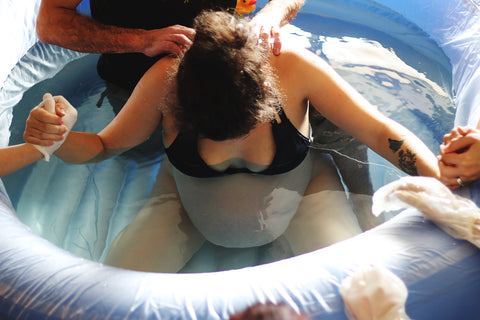9 Things To Consider When Choosing A Midwife for Birth + GYN Appointments
So, you’re having a baby and you want to find the perfect birth provider. For the last century doctors were the only option a woman had or even knew of with more than 95% of births taking place in the hospital. Today’s woman, however, has midwives and she has CHOICES.

Years ago you would have been opening a big fat can of worms by telling your friend and family you were choosing a midwife for your birth, but today, the midwife-led maternity care that’s so common in Europe is now rising throughout America. Birthing with a midwife isn’t just a choice. Given the studies and birth stories out there, it’s finally being seen as a smart choice.
But as great as midwives are proving to be, finding your perfect birth provider may still take contemplation and a little “midwife shopping.” When you’re meeting with potential midwives and getting referrals from other mothers, we have come up with a list of 9 very important things to consider while you’re shopping around.
1. WOMEN'S HEALTH SERVICES
A midwife specializes in prenatal care and birth, but a midwife is a healthcare professional with the potential to care for you before and beyond pregnancy and birth, dealing in all spectrums of reproductive care. The details can vary between states, but often, Certified-Midwives (CM) and Certified Professional Midwives (CPM) are able to perform the annual exams we have gone to gynecologists for, plus they can help us with Family Planning. Certified Nurse-Midwives (CNM) have the same ability to offer care in women’s health, but their nursing degree gives them the capacity to go even further in performing general exams, prescribing medications, caring for menopause, and providing contraceptive services (ie. birth control and IUD’s). The biggest difference here is that a Certified Professional Midwife's (CPM) scope is limited to pregnancy and concludes with the 6 week postpartum checkup. All midwives can have (and often do) have a consulting relationship with a physician when special scenarios arise that may need additional evaluation. It is also worth noting that each state has slightly different rules for midwifery so be sure to check out what the regulations say.
Pregnancy and birth opens the door to creating strong and personal relationships with our Birth Providers. Why not utilize these relationships in other realms of healthcare? By selecting a top-notch midwife now, you can find yourself an ally who can help you with a number of things concerning women’s health.
2.BIRTHPLACE OF CHOICE
A woman should feel safe in her birthing space. Does your home feel coziest to birth in? Would you prefer a birth center to avoid any cleanup (although most midwives will leave the space as they found it or better!)...or does a hospital birth give you the most peace of mind? Midwives work in all these spaces. This factor is pressing in determining who your ideal midwife would be, however, there are other considerations which you may find are even more important in planning for a healthy pregnancy and safe delivery.

3. PRESENCE (ATTENTION)
What does the midwives attendance actually mean-when and with whom? Doctors have been notorious for limiting their availability to “business hours,” and this has left women with a lack of security and a push for induction. Thus, women are turning to midwives.
However, we can’t assume that our midwife-of-choice will be present for all of our birth or any of it. What if she is attending another birth? We still need to ask about this upfront so that we know what a potential-midwife offers and how. She may prefer to be there from the first hour of active labor, or she may want to be there once you’re fully-dilated and ready to push. She also needs time to make sure she can call in any additional birth attendants, or rearrange a schedule if you are laboring during the day when they hold clinic hours. Communication is key. You won’t know until you ask, and she won’t know what you want until you tell her.
4. BACKUP PLANS (AND ASSISTANCE)
Understanding the Plan A, Plan B, Plan C-section potential outcomes is IMPORTANT. All birthing folks are planning on having a safe and healthy birth — that’s one reason why we’re choosing a midwife, after all — but birth is as simple as it is complicated. Most of the time (as my midwife once told me) a woman can birth all alone on an island and have a normal, uncomplicated birth. BUT, birth can turn in a moment (like a baby!).
I highly recommend searching for a midwife who can appreciate hospital care. While we all want to avoid unnecessary interventions, it’s imperative that your midwife can see where her skills and abilities reach their scope. There’s no room for ego when lives are on the line. A professional midwife will understand when her scope has been met and how to safely move on to the next order of operations for the mother/baby couplet's safety.
5. STATS AND NUMBERS
Your midwife should easily handle your questions about emergent situations and should help put your mind at ease. How many births turn into emergencies? What’s the rate for c-sections and other interventions? These are obvious questions we would ask a birth provider at a hospital, and that’s expected. However, we also need to be asking non-hospital midwives questions like: What is your fetal mortality rate? How many births become hospital transfers? What’s your success rate with delivering big babies/premature babies/babies with shoulder dystocia/mothers with a small pelvis/etc.
If you’re concerned about something like, say, you and your partner having a family history of large babies, this is just the thing that needs to be discussed not just before birth but before deciding on a birth provider. You want to make sure that your midwife has the skills and experience to catch your babe on your delivery. In order for you to focus on birthing a healthy and happy baby, you need a midwife who offers safety and quality care. This is crucial to a safe and meaningful birth, so don’t be afraid to ask these questions. Your well-being and your babies depend on it.
6. PREFERENCES
Share your preferences with your midwife. Midwives are often perceived as hardcore hippies, so we expect one to be down with outdoor births and delayed cord clamping. In actuality, midwives are as diverse as women as they are in their midwifery practice. You won’t know what your midwife supports or opposes until you discuss these things with her.
Make sure that your midwife is on board with whatever preferences you may have regarding birthing positions, newborn vaccinations, handling the placenta, cutting the cord, or (my personal favorite preference) getting hospital staff to relax on the ole' uterine pushing. You may find that things you had originally intended to skip become things that you decide to do. Personally, I had declined the Vitamin K shot for my two birth center births and I had planned on doing it for my hospital birth with my new midwife. However, when I discussed this with her, she shared her thoughts plus stats and a compilation of papers on the science and reasoning behind Vitamin K. After doing my own reading, I decided that this was something I actually supported.
Sharing your preferences with your midwife is as important for having your preferences accommodated, as well as making well-informed decisions and being confident in your choices.
7. BIRTH PROCEDURES (SKILLS)
A trained midwife should be comfortable with emergency skills, but it is worth discussing to help you better understand their work. Ideally we go into labor and we can give birth without any belly monitors, snipping, stitching, or the like. However, our desired birth may call for exceptions when things like dropping heart rates, "failure to progress", and shoulder dystocia comes into play.
Is your midwife skilled in procedures like episiotomies, stitching tears, heart rate monitoring, and mauevering with shoulder dystocia? Does she feel comfortable with performing them and does she feel confident in knowing when they’re warranted and necessary?
I discovered the importance of this with my first birth when my labia tore at the middle (my baby had a large head thanks to my own genetic contribution). When it came time to stitch me up, I become the head midwife’s live stitching demonstration for all of the other midwives and trainees. They hadn’t seen it before. I’m sure a busted labia made for awkward work, but the midwives at my birthing center didn’t seem to have a lot of experience with this kind of thing. The region changed and it took a year for it to feel normal again. As for the physical appearance, that never went back to normal. Maybe there was no other way for things to be, but then perhaps I would have experienced another outcome by more experienced hands.
It’s important to consider situations like these so that you know what to expect in possible birth scenarios. It also gives you the chance to come up with back-up plans that ensure you feel supported and taken care of no matter wherever and however birth happens. Again, communication is KEY.
8. SUPPORT (CARE)
Mothers should birth where and with whom they feel safest. Birthing can be a deeply vulnerable and intimate experience, so (outstanding) support is CRITICAL. Make sure that you have a midwife who can give you precisely the kind of care you need. This is one point where no woman should have to settle or make exceptions. Your body, your baby, your birth.

Whatever you think you’ll want and whatever you think you’ll need… Tell your midwife! If you want a dimly-lit room, hip-pressing, a massage, visualization meditations, a bath, essential oils, or even the seemingly-obvious coaching through hours of contractions, then say so. Yes, a partner or doula or friend could also do these things, but your midwife is there to assist YOU through YOUR BIRTH. If they aren’t open to assisting you the way you need them be assisted, then find a midwife who is. Ask the midwife what kind of midwife she is--hands on, hands off? Each woman has her own needs and each midwife has her own style.
Finding the perfect midwife for your birth sounds like a lot of work, but really…. It just takes advocating for you. Know who you are, and what you want, and know that you deserve it. Once you have that figured out, finding your ideal midwife will be a piece of cake.
9. Cultural Competency
Lived experience and culture matters. We know that we often do better when we feel understood in our lived experiences. Because emotions can run high in pregnancy, it is important to be able to feel that your care provider can empathize with us. While it is by no means a requirement to birth with a midwife who looks like us, having shared cultural experiences, language, and even particular birthing or postpartum traditions can impact the pregnancy journey. Some women may have to purposefully seek out a midwife to meet these requirements, but being culturally aligned can help improve birth and postpartum outcomes and expectations.

My daughter is going to be having a baby next year and she’s been wondering how she should choose her doula or midwife and what they should talk about. Thank you for the advice to talk about backup plans so that they are all ready for different outcomes. I’ll be sure to mention this to her so that she can find a time to discuss this with her as soon as she finds someone she’s comfortable with. https://holisticsouthpregnancybirthcenter.com/about-us/midwives/
Great points made here. We really need to encourage families to do their research before pregnancy. Well educated families have better birth outcomes and satisfaction. I’m looking forward to the day all women in the world have access to affordable reproductive healthcare.